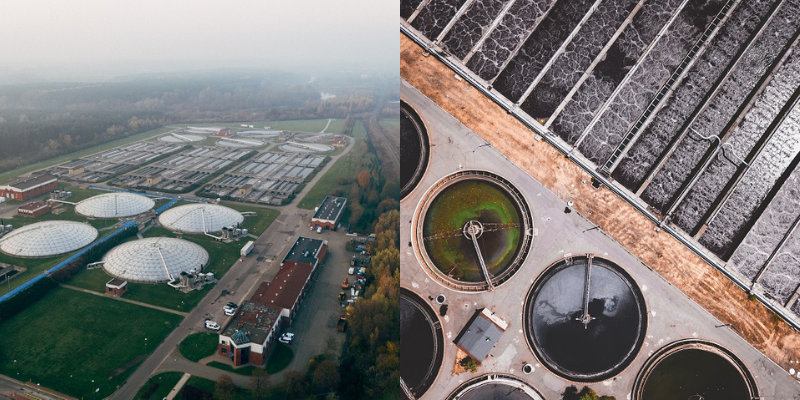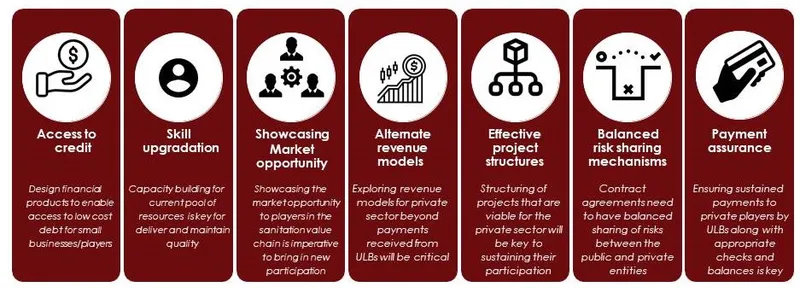Roping in the private sector in the sanitation sector could have a multiplier effect
While the government’s Swachh Bharat Mission is laudable, creating an ecosystem and nurturing Small and Growing Businesses (SGBs) to participate in the sanitation sector could be a game-changer.
Tanya Philip

Friday October 23, 2020 , 6 min Read
India is urbanising at a rapid pace and cities are becoming hubs for human development. With growing urbanisation, the stress on existing infrastructure is also increasing, which, coupled with changing lifestyles and consumption patterns, has contributed to issues like limited access to sanitation facilities such as toilets, collection and safe disposal of solid and liquid waste, etc.
The impact of ineffective sanitation in India is enormous, affecting the GDP, especially those at the base of the pyramid. It is estimated that India loses more than $106 billion of its GDP (> 5% of total) per year due to inadequate sanitation.
The Government of India has a considerable focus on addressing the burgeoning issues related to access to safe sanitation. For the last five years, ever since the Swachh Bharat Mission (SBM) was launched in 2014, its main focus has been on eliminating open defecation by constructing toilets and promoting their usage through widespread behaviour change programs.
The mission is moving onto its next phase from Open Defecation Free Plus (ODF+) focusing on solid and liquid waste management along with a special focus on plastic waste management. Additionally, programs like Atal Mission for Rejuvenation of Urban Transformation (AMRUT) and Smart City Mission have also put a lot of impetus on addressing the sanitation challenges of the country.
These initiatives have triggered a growing momentum with greater public and private interest in the sanitation sector in India with the sector witnessing more active policy-based and legislative pushes, as well as an increased investment due to the infusion of viable and remunerative business models. This has provided growth opportunities to various upcoming startups across the sanitation value chain focusing on providing innovative solutions.
The private sector, comprising Small and Growing Businesses (SGBs) have emerged as a potential partner to address sanitation-related challenges, and concentrated efforts to involve them shall also provide a huge boost to the nodal ministries in the Government of India in addressing the same.
However, it has been observed that irrespective of the Government’s initiatives there is still limited participation.
While the main barriers for sanitation businesses echo the more general challenges of doing business in India, there are some peculiarities to the sanitation sector that tend to compound these.
Enterprise level
- The existence of informal customer interface channels (e.g., in waste management) at the last miles makes it difficult for enterprises to access credit for their operational expenditures.
- Certain solutions tend to be highly capital intensive
- Lack of understanding of the market potential creates a significant entry barrier for new and emerging enterprises
- Due to the lack of awareness of other prominent players, these new enterprises are unable to forge partnerships
Investor level
- The investor community has limited awareness about the emerging technologies and sustainable business models that create impact
- Limited fund allocation for investment which leads to limited financing in the sector
- The sanitation business models are not seen as lucrative by the investor community
- The Financial Institutes (FIs) do not provide working capital citing unreliable revenue model
Regulatory/Ecosystem level
- Price capping mechanisms affect enterprise/private player profitability
- Key schemes that could benefit the enterprises are not widely publicised
- Project, contract, and payment structure are not enterprise favourable
- A limited number of ecosystem enablers such as incubators that possess the expertise and technical knowledge in the sanitation space are also barriers to scale in this sector
India’s macro-economic climate including factors like high-interest rates on loans, limited access to operational finance, and the high cost of utilities like electricity, etc. prove to be the biggest barriers affecting the viability of sanitation enterprises.
Although projects involving the provision of sanitation facilities are eligible for classification under priority sector loans as defined by the Government of India, the reality is that these loans are hard to come by especially in the case of sanitation projects whose revenues solely depend on one or two clients (largely public sector entities).
These SGBs also face working capital challenges primarily due to delayed payments from clients. While access to finance and delayed payments are major challenges, it has also been observed that the cost of partnership in the case of some public-private partnership contracts is too high considering the long-term nature of these contracts and their associated risks. Additionally, risk-sharing mechanisms adopted in these contracts also tend to be somewhat imbalanced. For example, some contract terms do not adequately account for risks such as climate and environmental risks associated with natural calamities or political risks associated with regime changes, etc.
Since the sector is relatively nascent in India, there remains a lack of awareness among stakeholders especially private sector/enterprises regarding the attractiveness and business opportunities that exist in the space.
To exacerbate this problem, different states adopt different models and contract structures that private sector players may be unfamiliar with, preventing them from scaling their operations to multiple states. Currently, the sector also lacks skill upgradation opportunities for the workforce across the value chain which would help to enhance the technical (design, operation, and maintenance) and non-technical (management) skill sets to ensure quality services.
There is a need to adopt an ecosystem-driven approach for shaping up the market and catalysing private sector engagement (SGBs/enterprises) to nurture businesses in the sanitation sector.
While private sector/enterprises have the talent, resources, and know-how required to help tackle the most pressing problems in the sanitation sector, it is critical to address these entry barriers to help them scale up and support the government in achieving Sustainable Development Goal-6 (SDG-6). These interventions may include developing a government-financed sanitation support infrastructure for SGBs as well as designing financial products to facilitate access to low-cost debts to improve the access to sanitation financing. Additionally, it is also important to create systems to ensure timely payments by putting in place assurances for government payments, innovative mechanisms like escrow accounts to help hedge such risks.
While the sector has potential, showcasing the business opportunity to build awareness and attractiveness of the sector among private sector/enterprises by sharing various state-specific market opportunities, details on project structures adopted, etc. becomes imperative.

This can be done by designing and adopting model contracts with balanced risk-sharing mechanisms with fair terms for public-private partnerships. To enhance enterprise capabilities, adequate and appropriate skill development and upgradation opportunities should be made available for those working across the sanitation value chain. Systematic training opportunities should be created for upgrading the skill set of the workforce to ensure quality delivery of services both at a technical and non-technical level.
These interventions would help in creating an enabling ecosystem that will aid in accelerating private sector participation in the sanitation sector. Private sector players such as SGBs have a critical role to play in bridging the demand-supply gap that currently exists in a cost-effective manner, thereby creating a meaningful impact.
(Disclaimer: The views and opinions expressed in this article are those of the author and do not necessarily reflect the views of YourStory.)











